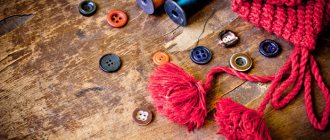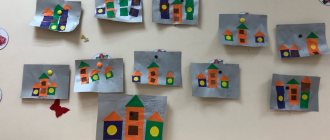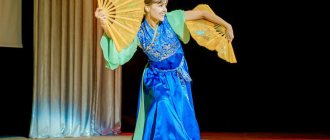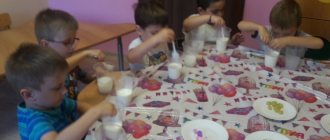Work program of the circle on the application “Skillful Hands” work program (middle group) on the topic
Municipal preschool institution kindergarten No. 44 of the urban district of the city of Neftekamsk of the Republic of Bashkortostan
Work program for the appliqué club
"Skillful Hands"
Educator: Ermakova N.I.
Neftekamsk
“The sources of children's creativity and talent are at their fingertips. In other words:
the more skill in a child's hand,
the smarter the child"
V. A. Sukhomlinsky.
Explanatory note
A child learns the world through manipulation, that is, actions with various objects that allow him to recognize and study their properties, while learning his creative abilities and changing what he touches. One of the child’s assistants in this most important task for his development is working with paper.
Applique is one of the simplest, most exciting and effective types of artistic activity. Children enjoy working with paper because it is easy to process. Non-traditional techniques for working with paper and non-traditional materials are especially attractive for children: torn, crumpled paper, paper napkins, cotton pads, etc. An unusual combination of materials and tools, accessibility, and simplicity of execution techniques satisfy the research need for them, awaken a feeling of joy, success, and develop labor skills.
Applique (paper plastic technique) is a synthesis of different types of visual activities: modeling, appliqué, drawing, designing from paper. Images in paper plastic are made in a semi-volume version; all parts and details are glued onto cardboard, which serves as a color background, which allows children to create bright individual and collective compositions.
By creating beautiful applications with their own hands and seeing the result of their work, children experience positive emotions. Working with paper gives children the opportunity to show patience, perseverance, imagination and artistic taste, show creativity, and acquire manual skills that allow them to feel independent. All this has a beneficial effect on the formation of a healthy and harmoniously developed personality.
The goal of the program: the development of manual skills in children through strengthening fine motor skills of the fingers and organizing joint visual creativity of children and adults.
Main goals:
- developing the ability to convey the simplest image of objects and phenomena of the surrounding world through three-dimensional appliqué;
- teach basic techniques in the “paper plastic” appliqué technique (tearing, crumpling, rolling into a ball); ability to work with glue, glue parts, attaching one to another;
- learn to work in a given space (gaining basic experience in composing a composition);
- enrichment of sensory impressions (at the level of sensations, the child learns the texture, density, color of paper);
- development of fine motor skills, coordination of hand movements, eye;
- development of speech skills;
- development of creative imagination, aesthetic and color perception;
- developing skills for accurate paper handling;
- nurturing the desire to participate in the creation of individual and collective works.
The program is designed for children of middle preschool age (4-5 years old)
This is due to the fact that at this age it is characterized by a significant increase in physical capabilities, especially the active development of small muscles of the hands, a change in the psychological position and the feeling of “adulthood” by preschoolers, the desire to show their individuality and creative abilities.
Club classes are held once a week for 20 minutes in the afternoon, in subgroups. The duration of productive activities with children can vary depending on the situation and the desires of the children. A flexible form of organizing child labor in leisure activities allows taking into account the individual characteristics of children, desires, health status, level of mastery of skills, being at a certain stage of the implementation of the plan and other possible factors. Each child works at his own level of difficulty, starting work from where he left off.
Classes are held in the form of a game; to play out a certain plot, poetic forms, fairy tales, movement and finger games, characters (toys and dolls from various theaters, images of a particular character who is played out) are used.
The duration of the program is 9 months.
Expected results:
Solving the problems of this program will help children master the basic techniques in the “paper plastic” technique: tearing and crumpling paper, coordinating their efforts and actions, conveying the image of an object, a phenomenon of the surrounding world. Mastering the skills of working with glue, and most importantly, will develop manual dexterity and fine motor skills, when the movements of both hands become more coordinated, and the movements of the fingers are differentiated.
The result of the program is exhibitions of children's works in kindergarten.
Literature: I.V. Novikova “Volume application in kindergarten”
I.V. Novikova “Working with non-traditional materials in
kindergarten"
A.N. Malysheva, N.V. Ermolaeva “Applique in kindergarten”
Internet resources
| Subject | Tasks | Material | |||
| September | |||||
| "Orchard" | Teach children to carefully tear small pieces of paper from large ones and carefully glue them onto cardboard. Learn to crumple paper, roll it into lumps, dip them in glue, and glue them to cardboard. | ½ white cardboard with a picture of a tree, colored paper (green, brown), red paper napkins, glue brush, napkins. | |||
| October | |||||
| "Autumn Leaves" | Teach children to carefully tear paper into pieces of different sizes and shapes, glue pieces of paper to cardboard, create an image of leaf fall, and continue to get acquainted with “warm” colors (yellow, orange, red). | Landscape sheet with a picture of a tree, colored paper (yellow, orange, red), glue, brush, napkins. | |||
| "Rowan Branch" | Continue learning to roll small pieces of paper into a tight ball and make a bunch of rowan berries from them. Cultivate a desire to make appliqué and finish what you start. Strengthen your hand and develop fine motor skills. | ½ sheet of cardboard, red paper napkins, glue, brushes, napkins. | |||
| November | |||||
| "Autumn bouquet for mom" (teamwork) | Reinforce the rolling technique, gently press the plasticine flagella, glue the yarn onto the piece of paper, and continue to form the desire to do something nice for your mothers. | Whatman paper, plasticine, Multi-colored yarn, Blanks of maple leaves, glue, napkins. | |||
| "Cockerel - a golden comb" | Practice clumping and rolling strips of paper napkins into flagella. Continue to develop appliqué skills (gluing paper flagella onto the silhouette of the tail, lumps on the body) | ½ tinted album sheet with a silhouette of a cockerel, paper napkins, glue. | |||
| "Bear Cubs" | Continue to teach how to carefully tear paper into pieces of different sizes and glue pieces of paper to cardboard. | ½ cardboard with an outline image of a bear, glue, napkins. | |||
| December | |||||
| "Drifts, snow on trees" (teamwork) | Strengthen children's ability to carefully tear paper into pieces of various sizes and shapes, carefully glue it to a base (on the crown of trees, on the ground), spatial mastery of the sheet, and development of imagination. Continue to learn to act together. | ½ tinted sheet of whatman paper with images of trees, sheets of white paper, glue, napkins. | |||
| "Winter picture" | Practice techniques for working with different materials: paper, cotton pads. Create your own composition placing tree and snowman on leaf | Application sample, Background (1/2 landscape sheet) blue, blue or purple paper; Glue, cotton pads, Simple pencil, Felt pens, scissors, Strips of white and brown paper, Napkin. | |||
| "The little white bunny is sitting" | Strengthen the ability to cut round and oval shapes from other geometric shapes (a circle from a square, an oval from a rectangle); Create an image of a hare. | Hare is a toy, Black paper (1/2 landscape sheet) – background White blanks sizes 6x4 cm, 3x4 cm, 1.5x1.5 cm Strips measuring 1x6 cm, 1x4 cm, scissors, glue, simple pencil, Napkin. | |||
| "New Year tree" | Teach children to make an applicative image of a Christmas tree from ready-made shapes (triangles), with partial overlap. Continue learning how to roll small pieces of paper into balls and use glue carefully. | ½ landscape sheet, green paper blanks (triangles of different sizes), double-sided paper in bright colors, candy wrappers, glue, napkins, brushes. | |||
| January | |||||
| "Bunny" (break applique) | Continue to teach children to tear small pieces of paper from a large one and carefully glue it onto the cardboard. | ½ tinted album sheet, white paper, cotton pads cut into pieces, glue, brushes, napkins. | |||
| "Valentine" | Practice working according to a template, cutting along the contour line | Sample, heart template, red cardboard 10x10cm. A square of white paper 4x4cm, a circle with a diameter of 2cm, scraps of green paper, glue, scissors, a simple pencil. | |||
| "Bullfinch on a Rowan Branch" | Create a voluminous applique using rowan berries in the form of lumps and techniques of tuck and partial gluing of the bullfinch’s wing. Practice cutting paper into narrow strips. Practice techniques for working with templates. | Sample, bullfinch figure templates, 1/2 landscape sheet for the background, red tissue paper, scissors, glue, brown paper for the branch, felt-tip pens. | |||
| February | |||||
| "Tumbler, pyramid" | Exercise children's ability to carefully tear paper into pieces of different sizes and glue pieces of paper along the contour. Reinforce your knowledge of primary colors. Cultivate a caring attitude towards toys. | ½ landscape sheet, colored paper (red, yellow, blue, green), glue, brushes, napkin. Tumbler toys, pyramid. | |||
| "Let's decorate the mittens" | Make your own pattern in the middle and along the edge of the product; choose decoration elements, develop creativity and imagination. | Mittens with decoration options, colored strips of paper, scissors, glue. | |||
| "Planes are flying" | Strengthen the ability to compose an object from several parts of different shapes and sizes (rectangles, strips). Use glue carefully and spread over the entire mold. | ½ tinted album sheet (in the shape of the Russian flag), blank airplanes made of colored paper (rectangles, strips). | |||
| March | |||||
| "Flowers as a gift to mom" | Teach children to create a beautiful arrangement of flowers (bouquet) using mixed media: plastic paper + torn paper, develop aesthetic perception, and form a figurative idea. Cultivate a caring attitude towards mother, a desire to please her. | ½ tinted album sheet with an outline image of a twig, yellow napkins, green and red colored paper, glue, brushes, napkins. | |||
| "The sun is looking out the window" | Continue to teach children to work in mixed media: plastic paper + torn paper, add missing details if desired, develop imagination, sense of color and shape. | Landscape sheet with a picture of a window, yellow paper napkins, yellow paper, glue, napkins. | |||
| "Cat and Mouse" | Exercise children in twisting flagella of different sizes from paper napkins and using them in appliqué, creating images of animals. | Sample. Background – dense Paper 1/2 landscape sheet, paper napkins of different colors, scissors, glue | |||
| "Decorative tray" | Introduce children to Zhostovo painting, name the elements of the pattern, traditional color shades; make decoration elements from colored paper. | Oval and round tray silhouettes, colored stripes, scissors, glue, samples. | |||
| April | |||||
| "Space" | Practice papermaking techniques. Gluing paper balls onto a prepared dark background. | black cardboard, yellow and white paper napkins, glue, napkins. | |||
| "Willow Twig" | Continue to develop the ability to roll small pieces of paper into a tight ball, tear small pieces of paper from a large one, and carefully glue them onto cardboard. | ½ colored cardboard, Yellow paper napkins, brown colored paper, glue, napkins. | |||
| May | |||||
| "Ladybugs" | Continue to develop the ability to tear pieces from a sheet of paper and paste them onto the prepared picture. Cultivate a caring attitude towards insects. | ½ green cardboard with an outline image of a ladybug, red and black colored paper, glue, napkins. | |||
| "Dandelions in the Grass" (teamwork) | Strengthen children's ability to carefully tear paper into small pieces, partially glue the workpiece so that it becomes voluminous (leaves). Develop the ability to work accurately. There is a desire to work together. | ½ tinted sheet of whatman paper, blanks for leaves made of green paper, yellow paper, glue, brushes, napkins. | |||
Simple applique for kids
This technique can rightfully be called a children's form of creativity. It develops motor skills, sensory perception, thinking, and imagination. Teaches you to understand shapes, colors, textures.
Promotes the development of attention, has a positive effect on the child’s perseverance and patience.
Children love bright colors, the rhythm of the arrangement of elements, and the ability to cut and connect paper figures.
Any mother can teach a lesson, so the classes help you bond with your child. Together with your baby, you can implement various ideas, stories and get a huge amount of positive emotions.
The most common figure in this type of decorative and applied art can rightfully be considered a circle.
It is thanks to the applique of circles and semicircles that both simple plots, accessible to small children, and complex three-dimensional compositions are obtained.
Flower applications
This craft can be presented as a gift for March 8th and birthday. Therefore, learning how to do it is extremely important.
Chamomile applique
- Number and sizes of circles per daisy:
- White 3 cm for petals – 5 pcs.
- Yellow for the middle of the flower.
- Green ones are small for the stem - in the required quantity, depending on the required length of the stem.
- Green 4 cm for leaves – 2 pcs.
Flower making process:
- We make petals by bending geometric shapes in half. Glue the petals to the base so that they converge at one point.
- Close the center with the middle of the flower.
- We form a stem.
- We create leaves from halves of figures.
Cheburashka applique
Options:
- Eight elements of the same size.
- Two elements for the eyes.
Execution of the application:
- Glue the ears to the left and right of the first sphere, and the body below. We create hands from halves of circles
- The legs are made from half circles, with the flat side down.
- Using a pencil or pen, draw the pupil, nose, and mouth.
Conclusion
Applications from circles of colored paper for children are an interesting and exciting process. By performing simple manipulations, you can get interesting scenes and create various objects of living nature.
This is an exciting activity that will introduce a child to creativity, develop many useful skills, and bring pleasure to the child and his parents.



